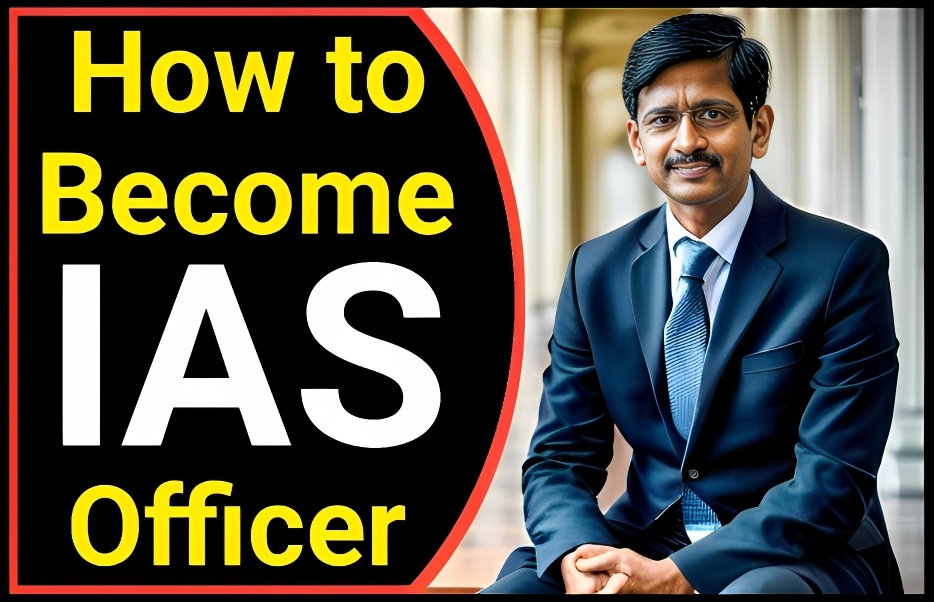How to Become an IAS Officer : UPSC

IAS (Indian Administrative Service) is one of the highest prestigious and competitive examination conducted by the Union Public Service Commission (UPSC) in India. Becoming an IAS officer requires dedication, hard work and extensive preparation. Here are the common steps you need to follow to become an IAS officer:
- Eligibility Criteria: Make sure that you fulfill the eligibility criteria set up by the Union Public Service Commission. The basic requirements include being an Indian citizen, possessing a bachelor’s degree from a recognized university and being between the ages of 21 to 32 (age relaxation is given for certain categories).
- Understand the Exam Pattern: Understand the Union Civil Services Exam Pattern thoroughly. The examination consists of three phases: Preliminary Examination (Objective Type), Main Examination (Written Examination) and Personality Interview (Personality Test).
- Prepare for the Preliminary Examination: The Preliminary Examination consists of two papers – General Studies and Civil Services Aptitude Test (CSAT). Study topics such as history, geography, polity, economy, current affairs, science, and environmental studies. Practice solving previous years’ question papers and take mock tests to improve your time management and accuracy.
- Prepare for the Main Examination: The Main Examination is a written exam consisting of nine papers, including essay writing, general studies, and optional subjects. Choose your optional subjects wisely based on your interest and strengths. Develop good writing skills, as the Main Examination requires descriptive answers. Study the syllabus thoroughly and refer to standard books, newspapers, magazines, and online resources.
- Current Affairs: Stay updated with current affairs by reading newspapers, watching news channels, and following reliable online sources. Focus on national and international events, government policies, and socio-economic issues.
- Optional Subject Preparation: If you are taking an optional subject, choose your study material wisely and refer to recommended books. Join coaching classes or online platforms that offer guidance specifically for optional subjects.
- Mock Interviews: As part of the preparation, attend mock interviews to enhance your communication skills, develop confidence, and practice answering questions in a structured and concise manner.
- Physical and Medical Examination: Clear the medical and physical fitness requirements as specified by the UPSC.
- Fill the Application Form: Fill out the UPSC application form online during the specified application period.
- Admit Card and Examination: Download the admit card from the UPSC website and appear for the Preliminary Examination, followed by the Main Examination.
- Personal Interview: Those who qualify in the Main Examination are called for the Personal Interview round. Be well-prepared to face questions related to your background, current affairs, general knowledge, and your chosen optional subject.
- Final Selection: The final selection is based on your performance in the Main Examination and the Personal Interview. The UPSC releases a merit list, and candidates are allotted positions based on their rank and preference.
Apart from this, you need to have patience, dedication, organization, organizing ability, ability to store facts thoughtfully, good communication ability with people, dedication to ethics and policies, the quality of a good and combative office bearer.
Do note that IAS preparation is a long drawn process and it requires a lot of hard work and dedication. On the official website of Union Public Service Commission (www.upsc.gov.in) you can get more details and access updated notes and books for most self-study for Science questions. Apart from this, taking help from a good coaching institute can also help you in your preparation. Remember, becoming an IAS can be a struggle, but it is a privilege to serve in the Union Civil Services which can contribute significantly to the development of the society.
What studies to do to become an IAS?
To become an IAS, you have to prepare for various subjects. You can do your studies keeping in mind the following topics:

- General Studies: General Studies is an important part of your preliminary and mains paper. It includes History, Geography, Indian Polity, Economy, Science and Technology, Art and Culture, Population and Organisation, General Science, General Mental Aptitude etc. You have to study these subjects thoroughly and use the relevant books for them.
- Geography: Geography is an important subject and IAS exam focuses on major geographical issues. To prepare for Geography, you will need an understanding of Physics, Map reading, Geographical terminology, Geographical processes and various Geographical organizations.
- Indian Polity: Indian Polity is an important part of your preparation. You have to focus on Indian Constitution, Indian State System, Functioning of Union and State Government, Judiciary, Citizenship, Administrative System, Emergency etc.
- Economy: Economy and economic issues are an important topic of your mains exam. You should have knowledge about economic crisis, national and international economy, budget, economic organization, financial market, investment, trade, commercial banking, commercial relations etc.
- General Science: In General Science subject you have to understand the main aspects of science and technology. You will have to prepare for various fields of science and technology such as physics, chemistry, biological science, science and general knowledge.
Apart from this, you will also need to focus on individual subjects such as General Hindi, General English, Mathematics, Psychology, Social Science, General Awareness, Computer Knowledge, Geography and Economic Affairs.
Make use of the best books, updated notes and concepts clarifying sources for your preparation. You will also find it useful to go through the syllabus and reference books available on the official website of the Union Public Service Commission (UPSC). It will also be beneficial to go through the UPSC exam pattern and previous year question papers during your preparation.
Which degree is required to become an IAS?
No specific degree is required for IAS (Indian Jumping Service). You must have a Bachelor’s degree from any recognized university. Your degree can be related to any field, such as Arts, Science, Commerce, etc.

Following are the eligibility criteria for IAS exam:
- Criteria: You must be an Indian citizen.
- Education: You must have a Bachelor’s degree from a recognized university.
- Age Limit: Your age is going to be between 21 years to 32 years where age is calculated taking into account the exam date. Age relaxation is given for OBC, SC/ST, J&K etc.
- Other Eligibility Criteria: Other eligibility criteria are prescribed by the Union Public Service Commission, which may include physical mental fitness, Acharya Samhita, medical standards to be followed, etc.
Therefore, you will need to obtain a recognized degree, be it in any field.
How many people apply for IAS in 1 year?
Every year a huge number of people apply for the IAS exam conducted by the Union Public Service Commission (UPSC). For your question, it is a bit difficult to provide you the exact figure as the number of applications varies every year.

The number of applicants for competitive exams can reach several lakhs. Similarly in IAS exam there is participation of lakhs of candidates. So, being a competitive exam, candidates have to put in more efforts to succeed.
The number of candidates who applied for IAS exam is not officially released by UPSC. You can get more information about the application number of previous years by checking the official website of UPSC and exam information magazines.
How much does it cost to become an IAS?
The expenditure required to become an IAS will depend on the financial level, duration of preparation, strategy and preferences of the individual. Therefore, it is difficult to provide a clear figure of this. However, a few important expenses may be overlooked:
- Coaching and Study Material: A lot of students join coaching institutes for IAS preparation which can be quite expensive. Apart from this, there may be expenditure on purchase of books, notes, test series, and other study material.
- Living Expenses: If you do not live near the coaching institute and want to prepare in a different city, then you will have to take care of the accommodation, food and other accommodation related expenses.
- Exam Fee: You will also have to pay the application fee for the exam which is conducted by UPSC. Its amount is decided by the examination commission.
- Equipment and technical material: You may need computer, laptop, internet connection, printer, scanner, and other technical material during preparation.
Including all these expenses, the amount of total expenses for IAS preparation will depend on the budget and arrangements of the individual. Also remember that some students try to improve their financial situation by working part-time jobs while preparing.
What is the salary of an IAS officer?
The salary of an IAS (Indian Jumping Service) officer is determined by the Government of India and can be maintained from time to time. The following outline gives the details of recognized pay and allowances of IAS officers as on date:

- Salary: The starting salary of an IAS officer at the time of posting is Rs.56,100/- (Mahiti selection date: January 01, 2016). Along with this, the officers also get an annual increment in the pay scale as per the rules of the Union Public Service Commission.
- Strangers: IAS officers get different pay depending on their posting, rotation, and other identities. Following are some of the key messages:
- Establishment Boka: Rs.2,500/- to Rs.4,000/- per month.
- Kolkata Boka: Rs.4,000/- per month.
- Remote Location Boka: Rs.5,000/- to Rs.30,000/- per month.
- Car Boka: Rs.9,000/- to Rs.20,000/- per month.
- Permanent Air Conditioner Bochka: Rs.7,500/- per month.
- Other Benefits: IAS officers get and enjoy other benefits such as pension, traveling allowance, non-accommodative insurance, mobile commercial insurance, internet allowance, savings account, etc.
The terms and conditions relating to the Terms and Conditions may be updated or updated as deemed fit. You should also note that the salary of IAS officers is subject to change under civil service selection and other taxes.
Author Hint:
We hope that you have got the right path from the information given by us, and you have got the right information,
If you like this post of ours, then you can also comment us, you can also SUBSCRIBE our website to stay connected with regular information. In the next post, we will know: How to become an IPS officer?
vurcazkircazpatliycaz.s7l5ZNh4Oy0j
pupilage xyandanxvurulmus.8Cizr522Dpb9